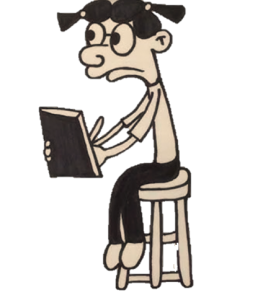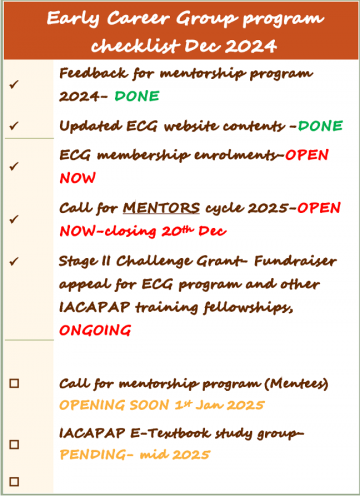Diary of a ‘Wimpy’ Early Career Group Coordinator
By: Dr Dina Mahmood, IACAPAP Early Career Group Program Coordinator- Sydney | Child and Adolescent Psychiatrist, Children’s Hospital Westmead, Sydney Children’s Hospital Network, Australia.
Dear Diary,
Global mental health work often stretches far beyond passion and good intentions. While identifying enablers and barriers in a global context is crucial, the real challenge lies in formulating effective implementation strategies. The Early Career Group (ECG) Program, launched by IACAPAP two years ago, serves as a case in point. How do we bridge time zone differences or reach those who hesitate to ask for help?

This journey has been enriched by encounters with dedicated individuals, many working with minimal resources. Some have sought help with proof-reading applications, while others have developed remarkable projects to improve vital outcomes in children’s mental health. Yet, it is difficult to shake the feeling of futility when confronted by logistical barriers or the ambivalence some face in simply engaging, especially for those who struggle with mastering access to emails and platforms or others who are very time-poor.
Reflecting on these challenges, I’m reminded of the privileges I enjoyed as a trainee in a well-established program. Weekly individual supervision with experienced child and adolescent psychiatrists, combined with peer-led discussions, transformed my training experience beyond lectures and journal articles. However, having spent the first half of my life in developing countries where hierarchical structures are entrenched in education and health systems, it took months to appreciate the value of mentorship and group supervision, and even longer to learn how to engage with them fully.

Supporting early career professionals is shown to enhance their growth, but it requires understanding and proactive support. I vividly recall sitting in an internet café in Jordan, struggling to decipher the instructions on the website for writing my first professional application. I also remember the deafening silence during my first supervision session, wondering, “What should I ask?” or “How do I admit that I don’t know where to start?”. Inquisitiveness is natural but often neutralised in a rigid learning environment that prioritizes standardized evidence and guidelines that may not fit every context.
Discussions like the one we had at the IACAPAP conference in Rio come to mind. An ECG group member debated the feasibility of inclusive schooling for children with mental health and disability needs in societies that are not yet fully aware or prepared to accommodate those needs. We talked about the missing step in between awareness and action. It became clear that fostering global solutions without understanding the nuances of local contexts isn’t enough. You can’t simply apply guidelines to every scenario. But perhaps we can develop creative adaptations that work within the limitations of the local environment. This is where mentorship and thoughtful guidance become key.
Understanding barriers is not enough, we need to provide practical tools to help our early career professionals define their needs, build support networks, and develop processes that work within their existing resources. The power of hope and instrumental thinking cannot be underestimated. One proud moment was when an early career psychiatrist placed in a sickle cell disease clinic exclaimed, “I can train my medical team to screen the children to determine who I should see!” His previous frustration stemmed from feeling that his one-day-a-week placement wasn’t sufficient to capture those in need of his services.
As part of the IACAPAP ECG Program, we realized that building accessible foundations is essential to improving both confidence and access to our program. One of our main priorities has become to strengthen the ECG website content, providing a clear description of activities to guide early career professionals through their options. These options have to be adaptable to fit variable needs. A balanced mix of anchored peer-led activities, support with individual initiatives and a structured program for mentorship.
After two years, the ECG Program has achieved significant progress, but much remains to be done. The journey so far has revealed the immense need for a community that supports early career professionals—not just in global mental health, but in their local training contexts as well. As we look to the future, we see numerous opportunities to further enhance our program, to refine the resources we offer, and to extend our reach even further.
This article represents the view of its author(s) and does not necessarily represent the view of the IACAPAP's bureau or executive committee.

